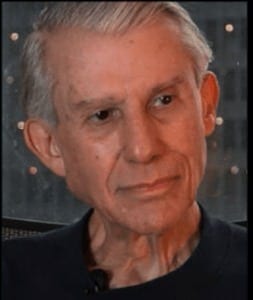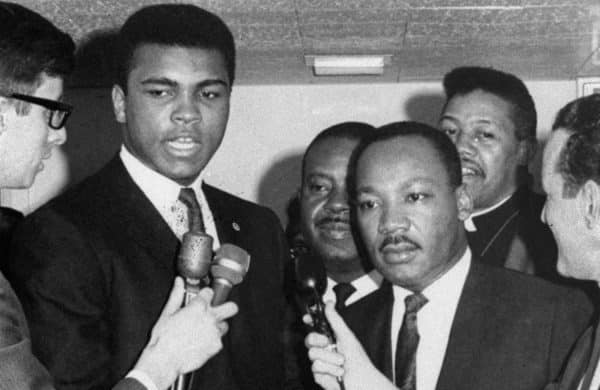Muhammad Ali: Anti-War/Civil Rights Activist
![]() Dispatches from
Dispatches from
STEPHEN LENDMAN

Receiving the 2012 Liberty Medal National Constitution Center Philadelphia, PA Photo by www.shak74.com … Attribution License 
Over time, it eroded his motor skills and ability to speak coherently. His wife Lonnie said even though his speech was impaired, “he sp(oke) to people with his eyes…with his heart, and they connect(ed) with him.”
…
Born Cassius Marcellus Clay, Jr., he joined the Nation of Islam in 1964, rejected what he called his “slave name.” Muhammad Ali replaced it. In 1975, he converted to Sunni Islam after Nation of Islam leader Elijah Muhammad died.
He refused army induction during the Vietnam war, publicly calling himself a conscientious objector, famously saying “I ain’t got no quarrel with them Viet Cong. No Viet Cong ever called me nigger.”
At his scheduled Houston army induction on April 28, 1967, he refused three times to step forward after his name was called.
Warned he was committing a felony, he stood firm. Arrest followed. The New York State Athletic Commission stripped him of his boxing license and world heavyweight championship title.
Other US boxing commissions followed suit. Ali couldn’t box anywhere for over three years. On June 20, 1967, a jury found him guilty. An appellate court upheld it.
Ali remained free pending the result of his Supreme Court appeal. On June 28, 1971, the High Court unanimously ruled in his favor at a time of nationwide anti-war activism – not based on his claims, because the appellate court gave no reason for denying his right to conscientiously object.
His conviction was reversed. He inspired Martin Luther King to voice public opposition to the war. Famously he called America “(t)he greatest purveyor of violence in the world – my own government. I cannot be silent.”
Ali’s anti-war activism “robbed (him) of his best years, his prime years,” his trainer Angelo Dundee explained.
Perhaps his best remembered quotes were, saying “I am the greatest,” and “float like a butterfly, sting like a bee.”
He’s less well-known for saying “I know I got it made while other black folks are out there catchin hell, but as long as they ain’t free, I ain’t free.”
Boxing is a violent sport, yet Ali espoused peace and nonviolence, opposed militarism, resisted racial discrimination and injustice.
His star power made his comments resonate. He abhorred the way Washington uses federal tax revenues for war-making, once saying:
“I buy a lot of bullets, at least three jet bombers a year, and pay the salary of 50,000 fighting men with the money they take from me after my fights.”
“Boxing is nothing like going to war with machine guns, bazookas, hand grenades, bomber airplanes. My intention is to box, to win a clean fight. But in war, the intention is to kill, kill, kill, kill, and continue killing innocent people.”
Ali used his fame to fight for justice outside the ring, fearlessly speaking his mind publicly. The world’s most famous pugilist became an anti-war, civil rights, nonviolence champion.
A personal note: In the early 1970s while Ali was still active in the ring, I ran into him in the lobby of my office building.
He was with several others at the time. We passed like ships in the night. I didn’t intrude to chat. Looking back, I wish I’d have extended my hand in friendship.
 STEPHEN LENDMAN lives in Chicago. He can be reached at lendmanstephen@sbcglobal.net. His new book as editor and contributor is titled "Flashpoint in Ukraine: US Drive for Hegemony Risks WW III." ( http://www.claritypress.com/LendmanIII.html ) Visit his blog site at sjlendman.blogspot.com.
STEPHEN LENDMAN lives in Chicago. He can be reached at lendmanstephen@sbcglobal.net. His new book as editor and contributor is titled "Flashpoint in Ukraine: US Drive for Hegemony Risks WW III." ( http://www.claritypress.com/LendmanIII.html ) Visit his blog site at sjlendman.blogspot.com.
=SUBSCRIBE TODAY! NOTHING TO LOSE, EVERYTHING TO GAIN.=
free • safe • invaluable
[email-subscribers namefield=”YES” desc=”” group=”Public”]

 Currently holds the Global TV Network Chair Professorship at McMaster University in the English and Cultural Studies Department and a Distinguished Visiting Professorship at Ryerson University. His books include:
Currently holds the Global TV Network Chair Professorship at McMaster University in the English and Cultural Studies Department and a Distinguished Visiting Professorship at Ryerson University. His books include: